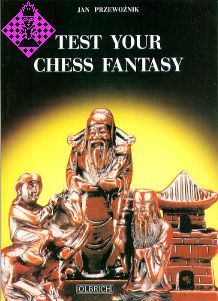Excerpts from introduction:
"Fantasy will never disappear from chess. There will always be innovators in this field who are gifted in finding unconventional means of unravelling problems that arise on the chessboard - eliciting admiration on the part of impartial and knowledgeable observers. Such creativity lies in the very nature of chess. Whether we like it or not, in our chess world a prominent place (amid tournament scoreboards, rating points, categories, and norms) is occupied by that which is aesthetic, artistic, truly creative. ...
... I feel confident that this is the book for those who would rather not count the squandered points after a tournament, but content themselves with every brilliant, startling idea realised on the chessboard. Would this be the book then, for every fortunate chessplayer? With no losers amongst them? In the world of paradoxes everything is possible."
"Fantasy will never disappear from chess. There will always be innovators in this field who are gifted in finding unconventional means of unravelling problems that arise on the chessboard - eliciting admiration on the part of impartial and knowledgeable observers. Such creativity lies in the very nature of chess. Whether we like it or not, in our chess world a prominent place (amid tournament scoreboards, rating points, categories, and norms) is occupied by that which is aesthetic, artistic, truly creative. ...
... I feel confident that this is the book for those who would rather not count the squandered points after a tournament, but content themselves with every brilliant, startling idea realised on the chessboard. Would this be the book then, for every fortunate chessplayer? With no losers amongst them? In the world of paradoxes everything is possible."
Excerpts from introduction:
"Fantasy will never disappear from chess. There will always be innovators in this field who are gifted in finding unconventional means of unravelling problems that arise on the chessboard - eliciting admiration on the part of impartial and knowledgeable observers. Such creativity lies in the very nature of chess. Whether we like it or not, in our chess world a prominent place (amid tournament scoreboards, rating points, categories, and norms) is occupied by that which is aesthetic, artistic, truly creative. ...
... I feel confident that this is the book for those who would rather not count the squandered points after a tournament, but content themselves with every brilliant, startling idea realised on the chessboard. Would this be the book then, for every fortunate chessplayer? With no losers amongst them? In the world of paradoxes everything is possible."
"Fantasy will never disappear from chess. There will always be innovators in this field who are gifted in finding unconventional means of unravelling problems that arise on the chessboard - eliciting admiration on the part of impartial and knowledgeable observers. Such creativity lies in the very nature of chess. Whether we like it or not, in our chess world a prominent place (amid tournament scoreboards, rating points, categories, and norms) is occupied by that which is aesthetic, artistic, truly creative. ...
... I feel confident that this is the book for those who would rather not count the squandered points after a tournament, but content themselves with every brilliant, startling idea realised on the chessboard. Would this be the book then, for every fortunate chessplayer? With no losers amongst them? In the world of paradoxes everything is possible."
| EAN | 3929324091 |
|---|---|
| Manufacturer | Olbrich |
| Width | 11 cm |
| Height | 15.2 cm |
| Medium | Book |
| Author | Jan Przewoznik |
| Language | English |
| ISBN-10 | 3929324091 |
| Pages | 139 |
| Binding | paperback |
| Diagrams | 120 |
| Name | Olbrich |
|---|
7 Introduction
10 1. Observation of Methodics
10 1.1 Test Characteristics
11 1.2 Test Construction
11 1.3 Exercise Classification
13 1.4 Progressive Level of Difficulty
15 2. How to solve the exercises and assess the level of performance
15 2.1 Intuitive appraisal
16 2.2 Analytic assessment
2.3 2.3 Calculation of Variations
17 2.4 Time Allowance
19 3. Exercises
81 4. List of correct answers
83 5. Solutions
130 6. Exercises classification and scoring
134 7. Favorable conditions for creative solving
137 Index of players and composers
139 Literature
10 1. Observation of Methodics
10 1.1 Test Characteristics
11 1.2 Test Construction
11 1.3 Exercise Classification
13 1.4 Progressive Level of Difficulty
15 2. How to solve the exercises and assess the level of performance
15 2.1 Intuitive appraisal
16 2.2 Analytic assessment
2.3 2.3 Calculation of Variations
17 2.4 Time Allowance
19 3. Exercises
81 4. List of correct answers
83 5. Solutions
130 6. Exercises classification and scoring
134 7. Favorable conditions for creative solving
137 Index of players and composers
139 Literature

